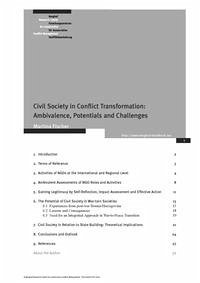What are the comparative advantages, and limitations, of civil society in contributing to peace-building? This paper from the Berghof Research Center for Constructive Conflict Management discusses definitions of civil society (CS); outlines examples of CS peace-building activities; and discusses the positive contribution and potential limitations of CS involvement, with particular reference to Bosnia-Herzegovina. Civil society can play a key role in peacebuilding, but cannot compensate for state-building deficits: the strengthening of the state, economy and society must proceed simultaneously. ‘Civil society’ is a contested concept, but definitions involve the idea of a space where the political, economic and private spheres overlap. Non-governmental organisations (NGOs: non-state, non-profit groups working in the public interest) are frequently seen as the most obvious example of civil society. Recent decades have seen significant expansion in NGO numbers and activity, in large part due to the increased level of funds channelled through them by donors. ‘Strengthening civil society’ has become a key element of peacebuilding interventions – civil society is often seen as the solution to multiple social, economic and political problems. However, there is a risk that this overestimates the capacities of CS actors.
Bitte wählen Sie Ihr Anliegen aus.
Rechnungen
Retourenschein anfordern
Bestellstatus
Storno

